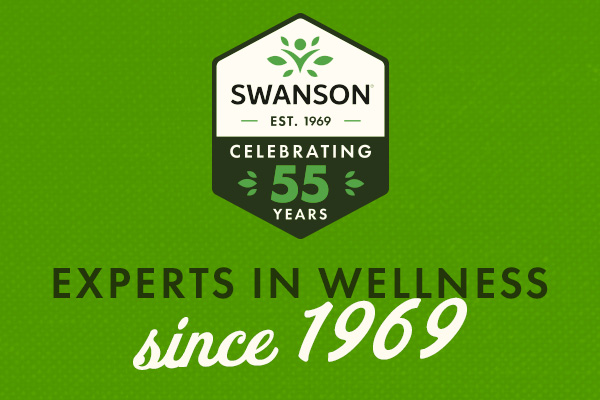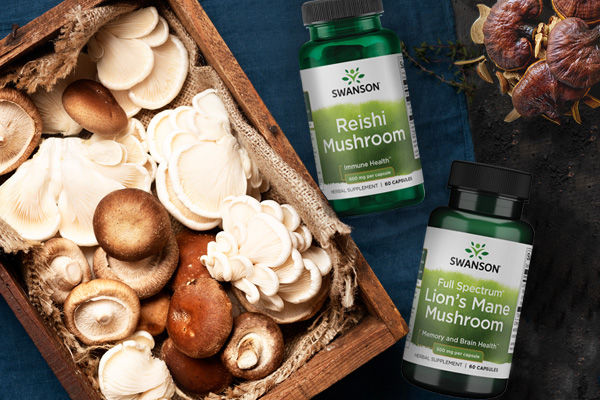Our Heritage: About Swanson Health Products
Diggin’ Into Our Roots
It’s a wild wellness world chock full of fast fads and a whole lotta hullabaloo out there. And with so many options to choose from when it comes to vitamins and supplements, it can be difficult to narrow down what options are worth their salt when it comes to pursuing a healthy lifestyle.
As for us, we’re hoping to leave this place lookin’ a little better than how we found it and cultivate holistic routines by offering remedies that work a little closer to nature.
Formulated with science and crafted with care, our products are carefully curated by our dedicated team of pharmacists, scientists, food nutritionists and a whole slew of experts to make sure all of our products are tested in accordance with the FDA to ensure guaranteed purity, potency and reliability.
We don’t mean to toot our own horn, but after 55 years of answering the call to care for our neighbors and our own—we think it’s safe to say that we’re pretty darn good at this whole healthy livin’ thing.
And after over half a century of dishin’ out wellness, we’ve got some pretty nifty stories that we’d love to share with ya. If that sounds good, you just come on in and make yourself at home.
Our Heritage
Like any good story worth telling, ours begins on a golf course. Yup, our first step toward better wellness started when our founder, Leland Swanson, wasn’t about to let achy joints get in the way of his backswing.
But it wasn’t just about avoiding a bogie on a par three—Leland had realized that joint discomfort was showing the potential to take away time and energy from what he was passionate about. In an attempt to regain control over healthy aging and continue doing the things he loved most with the people he loved even more—he started looking into remedies to keep his health on the straight and narrow.
The remedy that did just that? Vitamin E supplements.
And they worked! So well in fact that, like a true Midwesterner, he shared them with his friends. Then his neighbors. And next thing ya know he ordered 5,000 capsules and started Swanson Health Products in 1969.
Fun fact: We’re still selling that customer favorite to this day!
Anyway, fast forward ten years later and we have our very own brick and mortar retail store in our hometown of Fargo, ND with our first international sale just one year later. When the internet swept the globe, we launched swansonvitamins.com in 1999 to reach even more folks and opened a new 123,000 square foot facility along with over 200 employees to keep up with our customers’ needs.
The next decade earned us an NSF certification that shows our products meet the public health and safety standards set by the National Sanitation Foundation in accordance with the U.S. Food and Drug Administration. That along with the Trusted Store Distinction award to establish our credibility in online shopping spaces helped us double-down on being a trustworthy source for any wellness needs.
We also started helping do our part for the planet by going with geothermal energy. And by 2018 we had over 500 employees and our customer service team received global recognition for their outstanding support. (They’re still doing incredible work, you can always give them a shout if ya need any help.)
To take care of our own and help build healthier communities, we founded our first non-profit called Swanson Cares that you can support to this day. Since 2020, 100% of all donations received from our customers and employees goes straight to organizations that are committed to bettering wellness and creating thriving communities. You can learn more about our program, the organizations we support and how to give back right here.
Today with north of 1,500 Swanson products to choose from, you’ll find us workin’ hard to deliver wellness with love from the heartland. With a fresh face in 2024 from our brand update along with a tagline that really resonates with us (“You be well, now.”), our values remain the same and our dedication to delivering reliable remedies that you can trust still rings true.
All these years later and we’ve still got your back, neighbor.
Why We’re Here
In short, the heart of our work and the reason we do what we do is you.
Call us ambitious, but we aim to be the world’s leading authentic and trusted wellness partner. To do that, we promise to deliver pure, reliable science-backed solutions from the heartland to wherever you roam.
Our dedication to honest products through clean, simple ingredients has helped us become the neighbors in wellness that you’ve come to know over the years. We don’t cut corners, and we don’t put anything on the shelf that we wouldn’t give to our own families. That’s how we got started, and that’s how we’ll keep on keepin’ on.
After all, it’s your health for cryin’ out loud.
Your Neighbors in Wellness
55 years is no small feat, and we wouldn’t have been able to do it without you. You are what makes our story worth telling and where we find our inspiration to press on and pursue our mission to help you hit your wellness goals and live your best life out there.
Thanks again for stoppin’ by today! If you’re ever lookin’ to live a happier or healthier life, you just let us know—we’re just down the road and would be tickled pink to help.
You be well, now.
Swanson




